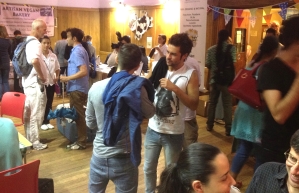
Festival co-facilitators Alison Coe and Robin Lane.
The best of success to Robin and Alison with the London Vegan Festival on Sunday the 17th of August. My vegan tweeter friend Mary-Anne of Heavenly Organics will be there too, along with advocates from London Vegans and so many others I’d love to hug. Personal circumstances are preventing that, so this is a sort of blogged hug to all of you.
The London Vegan Festival made its debut in 1998. (In 1996, at the annual general meeting of The Vegan Society, Chris Sutoris and Robin Lane proposed Britain’s first annual Vegan Festival.) The first year, in Conway Hall, the event drew more than a thousand people. In 2004 it moved to the multi-building Kensington Town Hall, which could accommodate all 1,500 festival-goers from morning until late in the evening. They came for veggieburgers and gourmet desserts, poetry readings, drum-jams and art workshops, strolling magicians and lessons in circus skills. There were fair-trade workshops, fresh juices, vegan beers and wines, aromatic massages.
The hall of educational tables, then and now, features everything from raw cuisine to human and nonhuman rights to networks for vegan runners. Some of the groups bring chefs and prepare fresh meals to order.
Typically the presentation rooms at the festival are filled to capacity. Some are cake-baking demos; some are psychological enrichment for long-time activists; some take on movement debates. In past years, I’ve presented talks on Whole Foods Market and whether that corporation’s influence in animal advocacy should be celebrated or resisted. Notably, the massive flagship store of Whole Foods Market in England is in Kensington, a stone’s throw from the festival venue. I’ve also given a presentation on the custom of pet-keeping from a vegan perspective, and at some point I’ll post the pet talk on this blog.
Early on, the London event was followed by an annual festival in Bristol, England; next, one in Sweden…. Now, vegan festivals are everywhere. They’re celebrations. They’re opportunities to stock up on vegan lip balm and clothing, the latest books on theory and advocacy, and, of course, cupcakes. They’re linking the word vegan with community.
In my three decades of living vegan, plausible statistics say, I’ve spared some 7000 fish—a great many of them caught to feed farmed fish; 4650 shellfish—mostly shrimp; and 930 land animals—mostly chickens. I’m just one person, averting the trapping, the purpose-breeding and confinement, the slaughter and consumption of more than twelve thousand animals! True, the crops I’ve eaten took up land where other bio-communities could have thrived untouched. But nowhere near as much land as I’d be responsible for using had I stayed hooked to an industry that grows feed for farm animals rather than direct food crops for people.
Significantly, I have also spared the foxes, coyotes, wolves, badgers and bobcats no one felt the need to displace for agribusiness, or kill because otherwise they’d have potentially eaten the farmers’ living stock. I’ve spared streams and oceans the consequences of the bodily waste of those 930 land animals and many farmed fish, and the antibiotics…all that fertilizer runoff from monoculture crops used to feed land animals and farmed fish.
In 1983, I wasn’t thinking of the numbers. I was in South London, at a concert, distracted by a leaflet on my seat. The holidays were approaching, and the leaflet explained how turkeys and geese would lose their lives for festive traditions; how puppies would appear under trees like toys, and how some, like toys, would be discarded in the months to follow; how the fur industry profited from the gift-giving custom; and many other things I must have always known yet never noticed. Who would come to a concert and put these leaflets on every seat?
And so I met Robin Lane. I’d never even heard of a vegan before, let alone met one. But as we stood in the auditorium lobby talking, it became clear to me that all the serious social and environmental activism I might do would fall short of its mark as long as my money went to the breeding and trading and storing and killing of other conscious animals. Through Robin, I became aware of the profound commitment that animal rights involves, and understood that I could be part of the problem, or part of the solution. With Robin’s help I became a vegan.
In the years since then, the movement I joined has succeeded remarkably. Vegan restaurants attracting celebrities in droves who want to be noticed at them. There are vegan events for athletes; take the V3K Ultra in the Welsh mountains—the first vegan ultra race. Started in 2012 by Kirsch Bowker, Chloe Vincent and Andrew Spencer Taylor, the event attracts runners who eat an animal-free diet for the race day, with aid stations offering vegan pizzas and cakes, sausage rolls and flapjacks, fruit and hot coffee and tea.
Two decades after I met Robin, we met again at the 2004 London Vegan Festival, where I also became a life member of the Vegan Organic Trust (now Vegan Organic Network). That year, farmers applying the vegan-organic method (no manure for fertility; no blood or bone meal) could, for the first time, have their produce specially certified. It was the debut of the Vegan Organic “stockfree” symbol. And a new book had come out: Growing Green – Organic Techniques for a Sustainable Future, to show organic growers how to do it without using the side products of animal agribusiness in their growing cycles. Ploughshares without the swords!

There again, in spirit.
At the 2006 London Vegan Festival, I met vegan cheese pioneer Keith Stott, whose exhibit for the Redwood Wholefood Company unveiled an array of the most wonderful vegan cheeses. They melted, and not with the look and smell of burning rubber). Hallelujah! Finally, I could admit I’d missed cheese. More than anything else, cheese—giving it up, that is—was the massive bane for many. No more. I filled my travel case with mature cheddar and gouda Cheezly, and Redwood’s game-changing take on traditional Lincolnshire sausages.
Each year I attended, I’ve heard return visitors thank the London Vegan Festival for inspiring them to actually become vegan. And this month, I’m a facilitator for our local Chester County Vegan Festival, just outside Philadelphia. Although I’ll miss out on the London Vegan Festival, I’ll be there in spirit, and, here in my local community, carrying it outward. Our county festival is unlikely to get as many people as London’s, but ours too has inspired other, similar festivals to sprout up around us. The success of vegan festivals gives hope to those who know what we do can change people’s whole worldview, along with sparing countless thousands of animals from human harm.
Love and liberation,
Lee.








Pingback: The London <b>Vegan Festival</b> 2014 | Vegan Place | Veg Fiesta